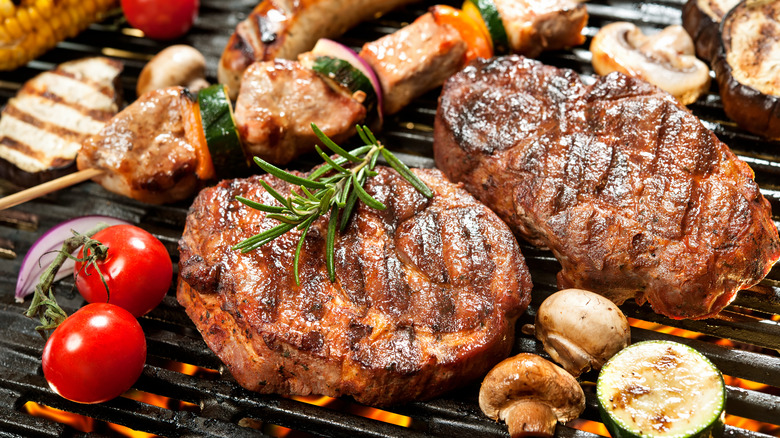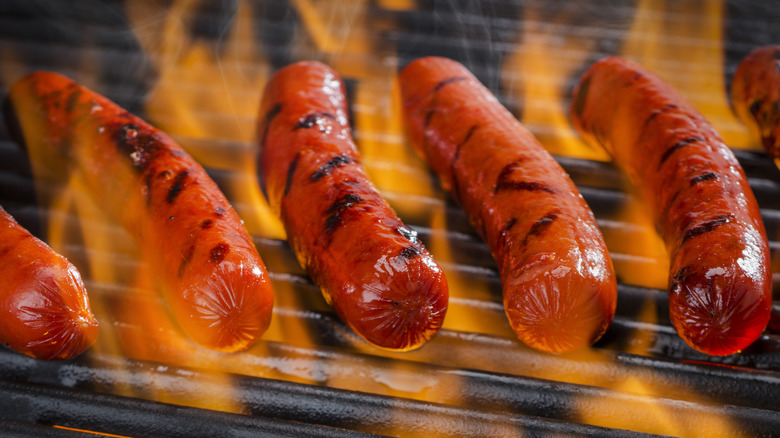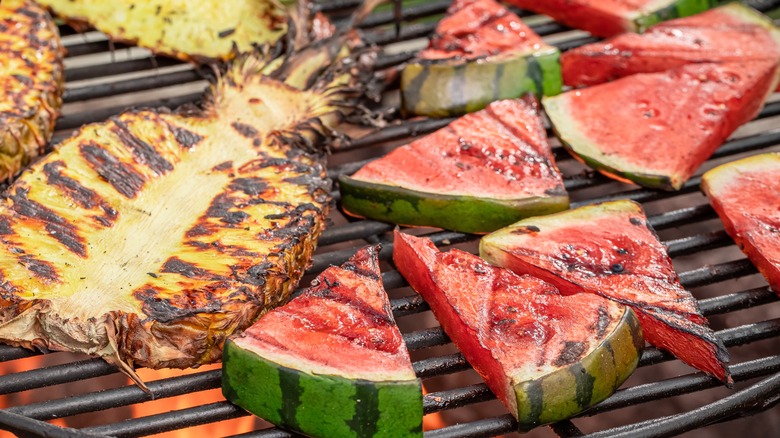The Order You Should Cook Your Food In At Your Next BBQ
Planning your perfect backyard barbecue takes practice, patience, and — most importantly — planning. If you want all of your barbecued bites hot off the grill and on the table at the same time, there are some elements to take into consideration. Grill times in general will vary depending on a multitude of factors, including the type and model of the grill, how many items are on the grill grate at once, and even the weather and time of year. However, there are important factors that lie more in your control.
The food items that will take the longest to cook, such as thick pieces of meat or those with a bone, should be put on the grill first. Not only does this allow ample time for them to cook through, but the grill will be at its hottest when first fired up. Thickness and desired degree of doneness must be taken into account when planning the order of cuts and types of meat. A medium-rare grilled skirt steak will take a handful of minutes per side, while a bone-in chicken thigh will probably take about 40 minutes. A roast or ribs could take up to an hour or longer, depending on its size and type. Remember to take resting time into account for meat as well.
The general gist to follow is to assess the thickness of meats, and order them accordingly. The other foods you grill are a bit more straightforward.
Burgers and dogs fall in the middle
Next up are often the stars and staples of any barbecue. Most packaged hot dogs are precooked, and only need a few minutes to achieve a tasty char and heated center. Burgers will take 10 to 16 minutes, depending on your preference for how they're cooked, as do pork and lamb chops.
Vegetables usually fall toward the end of the grilling assembly line, but may land in the middle depending on the type. Keep the rule of thickest and densest first in mind, and apply it within the vegetable group. Veggies that take the longest, such as potatoes and corn, go to the front of the line. Corn can take 15 to 20 minutes, and potatoes may take up to a half-hour depending on the size and type of potato you are grilling. Vegetables like zucchini and mushrooms will need less time, around eight minutes, as will peppers and onions.
Fish can be finicky on the grill, and requires some finesse. If you dare to go there, it's best to save it for when you can give it its due attention. Since most fish and shellfish don't need as long as most meats, it may be best to save them for last. A fillet of salmon will take around 10 minutes to cook depending on its thickness, and shrimp will only need five to six minutes. A handy rule of thumb to follow for fish is 10 minutes per one inch of thickness.
Other BBQ tips and tricks
To have everything come together at once, pop the quicker-cooking vegetables on while the meat is resting. You can also use the upper rack of your grill to keep food warm. To avoid a meaty taste or remnants, reserve a spot for any fruit you want to grill for vegetarians or dessert. It can be the same area you used for vegetables if they didn't contain powerful seasoning. Try precooking your meats for a head start. You can start chicken in the oven and finish it on the grill to get the grate marks and flavor. You can also boil sausages to make them juicier and then pop them on the grill to char.
Taking cook time into consideration when skewering your kebabs is also a handy trick. While a rainbow-colored kebab with an array of meat and vegetables is pleasing to the eye, it doesn't make much sense from a practical standpoint. Stick to one item per skewer — one for onion, one for mushrooms, one for peppers, and one for meat. This gives you greater control over the length of time they stay on the grill. You can pile everything onto a platter for a colorful serving display.
You can also choose to cook quick-cooking items like hot dogs and burgers first so people have something to munch on while they wait for the steaks and chicken. Ultimately, it all comes down to timing, and how you would like your party to play out.



